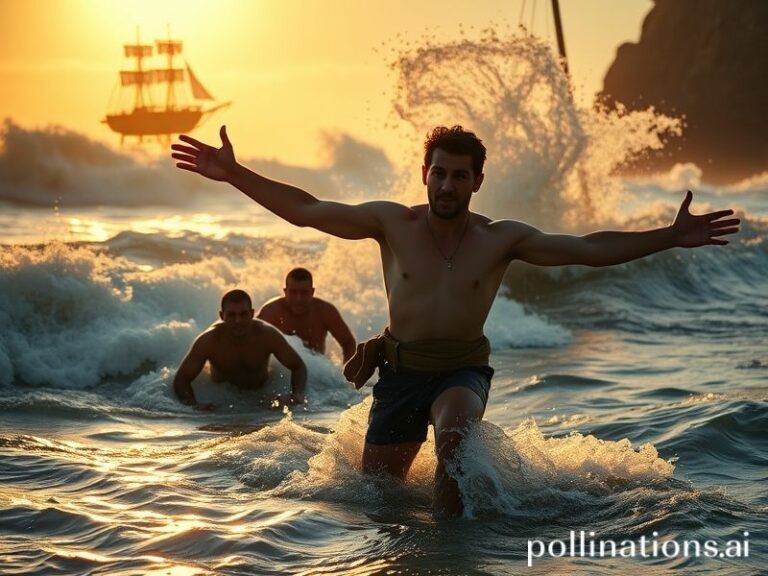Peyton Manning’s Kids: How Three Nashville Tweens Became America’s Newest Soft-Power Export
Peyton Manning’s Kids and the Quiet Globalization of the American Quarterback Gene Pool
By Our Correspondent, Somewhere Between a Munich Beer Hall and the Delhi Duty-Free
In the pandemic’s bleary aftermath, the planet’s attention-starved continents have found one low-stakes consensus: staring at other people’s children. Enter Marshall, Mosley, and the inexplicably vowel-deprived “B” (short for Benjamin, but apparently the Mannings budgeted for only one syllable). Peyton Manning’s three offspring—spawned in Denver but now roaming Nashville—have become an unlikely soft-power export, their every flag-football fumble live-streamed from a 5G tower to a Lagos sports bar that still thinks Eli is a type of currency.
From a strictly planetary perspective, the Manning boys are America’s latest cultural tariff. We already ship Marvel films, corn syrup, and democracy starter kits; now we bundle in quarterback DNA and slap a Nike swoosh on the embryo. The implications ripple outward like a poorly thrown spiral. In Argentina, a youth coach named Diego (of course) replays Peyton’s sons’ seven-yard outs on YouTube and wonders why his own protégés can’t replicate the footwork—never mind that half the kids are playing barefoot on a converted polo field. Meanwhile, Chinese streaming giant Tencent quietly adds a “Future Manning” filter to its sports app, allowing 200 million users to graft Peyton’s forehead onto their toddlers’ faces. Soft power, hard drive.
Observers in older empires sniff imperial déjà vu. “The Yanks have weaponized the family unit,” mutters a retired MI6 officer over lukewarm ale in London. “First it was Kennedy spawn, then Bush scions; now we get quarterback princelings who can audible at the line of scrimmage and probably at a NATO summit.” He’s only half joking. The Pentagon’s latest Indo-Pacific strategy document, leaked by a disgruntled lieutenant with a TikTok habit, lists “cultural stickiness via elite athletic bloodlines” under non-kinetic deterrence. Translation: if little Mosley Manning ever throws a touchdown in Manila, maybe the Philippine navy will forget those nine-dash lines.
Back in Tennessee, the Mannings insist they’re just raising kids, not geopolitical assets. Peyton, whose forehead alone could host a United Nations subcommittee, told a local reporter he wants his sons “to choose their own paths—doctor, lawyer, or mediocre podcaster.” Yet every autumn Saturday, ESPN’s satellites beam Marshall’s high-school highlights into 73 countries, including some that still measure distance in cricket pitches. The network’s chyron helpfully translates “Cover-2” into Urdu, because nothing says cultural bridge-building like explaining zone defense to a nation that treats baseball as an elaborate prank.
Economists have taken note. The University of Zurich recently published a working paper titled “Quarterback Endogamy and Global Brand Elasticity,” arguing that a Manning grandchild drafted in 2043 could single-handedly shift NAFTA 2.5 negotiations. Their model assumes the child signs with the Toronto Argonauts, thus forcing the U.S. to reclassify Canadian bacon as “ham” in exchange for tariff-free maple syrup. Peer reviewers called it “methodologically suspect”; the Swiss authors countered that they used the same Monte Carlo simulation that predicted Brexit, so the bar was already subterranean.
And then there is the darker calculus. In a world on fire—literally, see Athens last July—following the leisure habits of three affluent tweens offers a sedative glow. Climate refugees huddle around cracked smartphones outside Athens’ port, watching Marshall Manning thread a post route while wildfire ash floats like tragic confetti. Somewhere, an algorithm notes the juxtaposition and serves them an ad for flame-retardant jerseys. Capitalism, ever the opportunist, finds a way to monetize even the apocalypse’s halftime show.
Still, one must concede the universality of the ritual: parents everywhere just want their kids to throw straighter, run faster, and avoid concussions—both literal and electoral. Whether you’re in a Kansas suburb or a Kenyan slum, the sight of a father crouched in three-point stance, barking cadences at a giggling nine-year-old, scans the same. The language is different—Omaha! Homa! Hakuna Matata!—but the hope is identical: maybe this one makes it out.
So we watch the Manning boys grow, aware that their gridiron bedtime stories are simultaneously bedtime stories for a planet that refuses to sleep. And if, come 2036, Marshall drops back on a floodlit field in Dubai while Mosley reads the defense from a luxury box paid for by sovereign wealth, we’ll know the experiment worked. Until then, we keep the livestream open, the comments section multilingual, and the existential dread on a rolling play-action fake.
After all, every empire needs its heirs—and its highlight reels.







